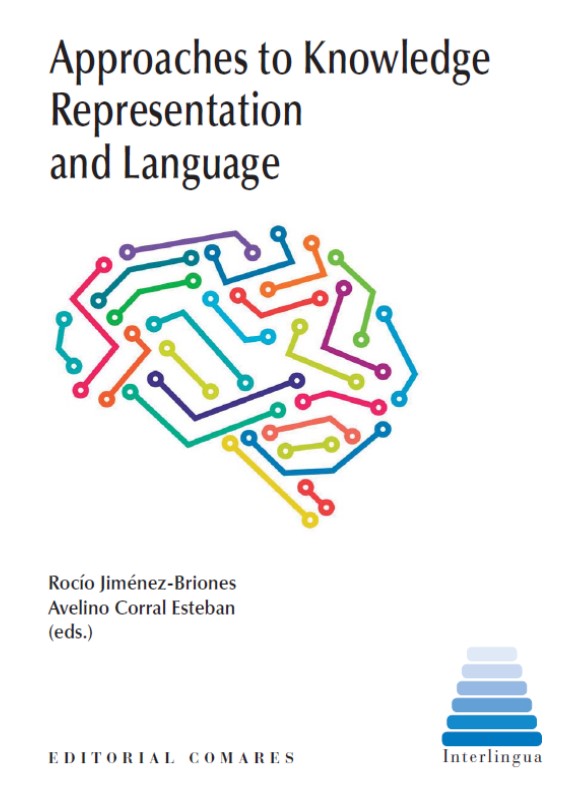Novedad bibliográfica
This monograph aims to serve as a catalyst for the publication of high-quality papers on topics of importance for today´s society related to knowledge and language representation by delving into the latest approaches and methodologies within this field, particularly in the context of natural language understanding and processing.
Throughout the lens of cognitive science, the chapters showcase fresh insights into the construction and representation of meaning and knowledge, drawing upon notions, concepts, and analytical tools from sociology, artificial intelligence (AI), and various branches of linguistics, including functional, cognitive, computational and corpus linguistics.
Many of the chapters feature studies carried out within competitive research projects to illustrate the synergy between theoretical and computational linguistics alongside NLP techniques, which has yielded applications in sociology, sentiment analysis, and dementia pre-diagnosis. Other chapters present innovative research on the organizational power of metonymy and conceptual metaphor, on the implicational constructions and attitudinal and denotational figures of speech in the context of irony, as well as on the cognitive nature of attenuation and related figures like meiosis and litotes. Likewise, this monograph includes the latest research in the Formalised Lexical-Constructional Grammar (FL_CxG), highlighting its potential as a robust model of unification grammar with computational implementations.
In sum, this edited volume offers valuable reading and challenging ideas for (post)graduate students, researchers and scholars with an interest in these fields. There exists a distinct demand and opportunity for a publication that establishes a compelling link between the advancements in linguistics and computational models. The editors and authors believe that this work is a timely and pertinent scholarly addition to the significant needs within the domains of functional-cognitive and corpus linguistics, sociology, AI, and NLP.
Acknowledgements
Rocío Jiménez-Briones
Avelino Corral Esteban
I KNOWLEDGE REPRESENTATION FOR SOCIAL SENSING AND LANGUAGE
Chapter 1.—Exploring problems through social media: The case of Beach Quality
Carlos Periñán-Pascual
Chapter 2.—Description of social problems by means of schemas related to the Income domain in the DIAPASON platform
Ángel Felices-Lago
Chapter 3.—Integrating corpus methodology into the construction of an intelligent crowdsensing system
Pedro Ureña Gómez-Moreno
Chapter 4.—Social media detection of texts on the social problem of violence against women within the multimodal intelligent system ALLEGRO
Ángela Alameda Hernández
Chapter 5.—Exploring the creation of synthetic corpora of negative communicative functions for the task of communicative function identification
Nicolás José Fernández-Martínez
Chapter 6.—Negation as a polarity shifter in English: An NLP approach
Yolanda Blázquez-López
Chapter 7.—A hybrid conceptual model using statistical and linguistic methods for prescreening memory through language and cognition
Kulvinder Panesar
María Beatriz Pérez Cabello de Alba
II KNOWLEDGE REPRESENTATION FOR COGNITION AND LANGUAGE
Chapter 8.—The Spanish implicational constructicon: A case study from the perspective of Cognitive Linguistics
María Sandra Peña-Cervel
Carla Ovejas-Ramírez
Chapter 9.—Cognitive operations in anglicized Moroccan fragrance brand names
María Enriqueta Cortés de los Ríos
Fatima Azzahraa El Yamlahi
Chapter 10.—A cognitive-pragmatic account of axiological neutrality in ironic constructions
Inés Lozano Palacio
Chapter 11.—Revisiting understatement: A cognitive-linguistic approach
Francisco José Ruiz de Mendoza Ibáñez
María Sandra Peña-Cervel
III KNOWLEDGE REPRESENTATION FOR SYNTAX AND LANGUAGE
Chapter 12.—Encoding reference phrases into AVMs in the Formalised Lexical-Constructional Grammar
Emmanuel Hernández Hernández
Chapter 13.—Interrogatives in the Formalized Lexical-Constructional Model (FL_CxG): The case of polar questions
María Auxiliadora Martín-Díaz
Marta González-Orta
Chapter 14.—Feature-based representations of the ‘spray/load’ alternation: A Formalised Lexical-Constructional Grammar account
Carolina Rodríguez-Juárez
Universidad Autónoma de Madrid
<rocio.jimenez
 uam.es>
uam.es>













